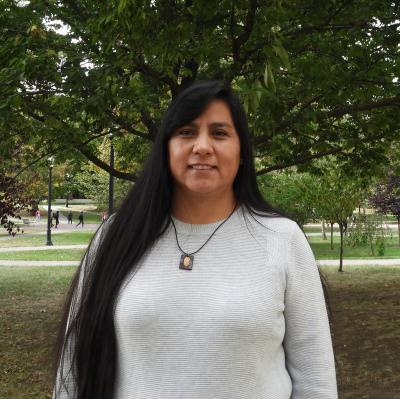In the Spring 2020 Edition of the SPPO Newsletter, we highlighted Elvia Andía Grágeda, the coordinator of SPPO’s Quechua Language Program, and her passion for educating students on the Quechua language. In this article, we will learn how her experiences growing up in an indigenous community of Quechua-speakers in Bolivia inspired her debut novel, Pirqakunawan parlaspa - Hablando con las paredes.

The novel is written in both Spanish and Quechua and focuses on a number of themes, including the indigenous woman and her role in society, the realities faced by disabled people within indigenous communities, and the practices and customs of Quechua. Andía Grágeda explained that her inspiration for writing the book stemmed from the difficulty of finding Quechua literature for her classes. “I’m always looking for new material for my students, but what I often found were only retellings of common stories that had been translated into Quechua. I realized that these stories were not written by Quechua people, they were just written by people who know Quechua.” She wanted to write her own story that truly reflected the Quechua culture. “Quechua people have so much to say! We don’t need to be retelling the same stories that everyone’s already heard before.”
Pirqakunawan parlaspa - Hablando con las paredes focuses on the life of Andía Grágeda’s parents and grandparents. She explores the hardships that her grandmother faced as a single mother with ten children within the Quechua community and the expectations that were placed on her as an indigenous woman. It also highlights the treatment of people with disabilities within the community. Elements of Quechua culture are deeply intertwined within the novel as she recounts these stories of her family. “This is a story that I know. I hope that it brings more awareness to my community.”
At the end of 2019, Andía Grágeda was awarded the Premio Guamán Poma de Ayala en Lengua Originaria, a national literary prize in Bolivia, for her novel. The prize was overseen by the Ministry of Culture and Tourism of the Plurinational State of Bolivia. The contest included seven categories and the Ministry placed particular emphasis on Andía Grágeda’s award, as 2019 was the International Year of Indigenous Languages.
Andía Grágeda has made a great impact at Ohio State and beyond with her dedication to bringing awareness to the Quechua language. Last year, in addition to her Bolivian Literary award, she also became the world’s first certified Oral Proficiency Interview (OPI) tester in Quechua. The OPI is the assessment tool created by the American Council on the Teaching of Foreign Languages (ACTFL), the premier professional organization in foreign language education in the US; the tool is used to evaluate oral proficiency in diverse languages, including Spanish, French, Arabic, Hindi, Mandarin, and, now, Quechua. As an OPI tester, Andía Grágeda can grant the Seal of Biliteracy to students in the state of Ohio who demonstrate proficiency in Quechua.
Looking towards the future, Andía Grágeda is excited to continue developing OSU’s Quechua program, with the support of the Department of Spanish and Portuguese and the Center for Latin American Studies. She hopes that she can bring greater recognition to the Quechua people, language and culture as the program grows.
